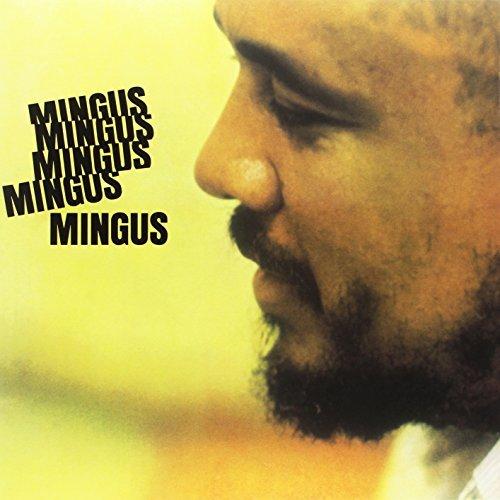Charles Mingus
Mingus Mingus Mingus Mingus
Mingus Mingus Mingus Mingus
Couldn't load pickup availability
Personnel: Charles Mingus (piano, bass); Jerome Richardson (soprano & baritone saxophones); Eric Dolphy (alto saxophone, flute); Charles Mariano (alto saxophone); Dick Hafer (tenor saxophone, flute); Booker Ervin (tenor saxophone); Eddie Preston, Richard Williams, Rolf Ericson (trumpets); Britt Woodman, Quentin Jackson (trombones); Don Butterfield (tuba); Jaki Byard (piano); Jay Berliner (guitar); Walter Perkins, Dannie Richmond (drums).
Recorded January 20 and September 20, 1963. Includes liner notes by Nat Hentoff.
Digitally remastered by Erick Labson.
For bassist/composer Charles Mingus, many of the leading edge trends of the late '50s-early '60s did not significantly alter his musical outlook--an outlook he had been nurturing since the 1940s when he first made his mark as Baron Mingus. "Mingus, The Composer" was Charlie Parker's affectionate commission for the Californian bassist, who first made waves with "Mingus Fingers" for Lionel Hampton's big band in 1948. As a result, when Miles came along with fresh notions of modality, Mingus could point to his own decade-long work with pedal point. Likewise, when Ornette Coleman introduced his free form, non-chordal approach to blues and modern jazz, Mingus responded with his legendary Booker Ervin/Eric Dolphy/Ted Curson/Dannie Richmond ensemble (MINGUS AT ANTIBES), extending on ideas he'd been developing for years ("Pithecanthropus Erectus").
Part of what makes MINGUS MINGUS MINGUS MINGUS MINGUS such a rich, enduring, listening experience is in the way it delineates the major themes and streams in Mingus' writing, and all of his idiomatic gestures and tonal colors. The rough-hewn polyphony of "II B.S." (a kissing cousin of "Haitian Fight Song") is driven along by the composer's indomitable, thrusting bass line, reflecting the experience of early New Orleans ensembles. Multiple voices syncopate to create a rich melodic fabric and ferocious rhythmic intensity, spotlighting the sanctified tenor voice of Booker Ervin. On his own "I X Love" and a brilliant cover of Ellington's "Mood Indigo," Mingus displays a genius for film noir textures and elaborate timbral contrasts worthy of the Duke.
"Celia" also begins with Ellingtonian plumage, but in its use of contrasting tempos and wildly divergent reed and brass voicings (from tuba and baritone sax on up to flutes and oboes) Mingus zeroes in on his own particular brand of emotional turbulence. In a corresponding mode, there's his rocking arrangement of "Better Get Hit In Yo' Soul," with its fleet 6/8 pulse, old time hosannas and the roaring commentary of an unruly congregation. Equally famous is Mingus' tender portrayal of Lester Young on "Goodbye Porkpie Hat," with its piping reeds, moaning brass and signature Ervin solo. Mingus announces "Hora Decubitus" with some resounding double-stops, before launching into a fierce display of swing and ensemble interplay, culminating in some Eric Dolphy fireworks. And in a remarkable coda to the original sessions, there's the dark poetry of an unissued "Freedom," with its evocation of work songs, the liberating beat of modern jazz, and the joyous release of the blues.
- RSD Release Date: DDD
- Format: Vinyl
- Released: 02/16/18
- Genre: Jazz
Shipping
Shipping
Global Shipping
Insured Heavy-Duty Packaging
Return policy
Return policy
We offer a 10-day from delivery, no-hassle return or exchange policy. To contact us or read more, click HERE.


